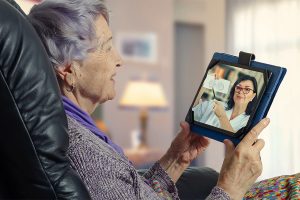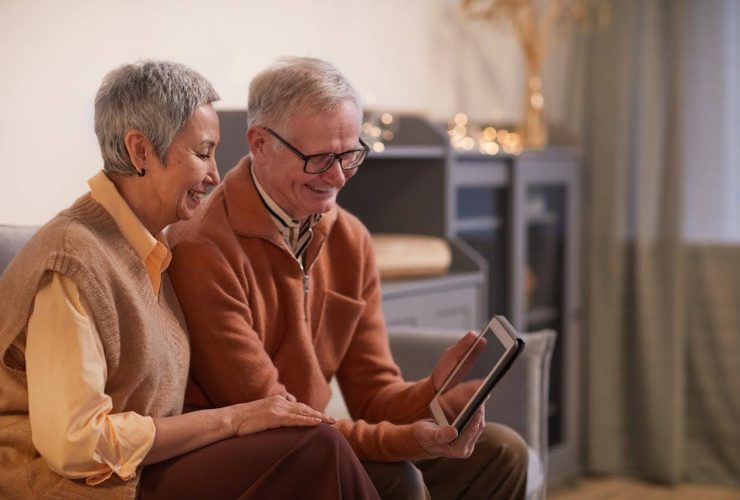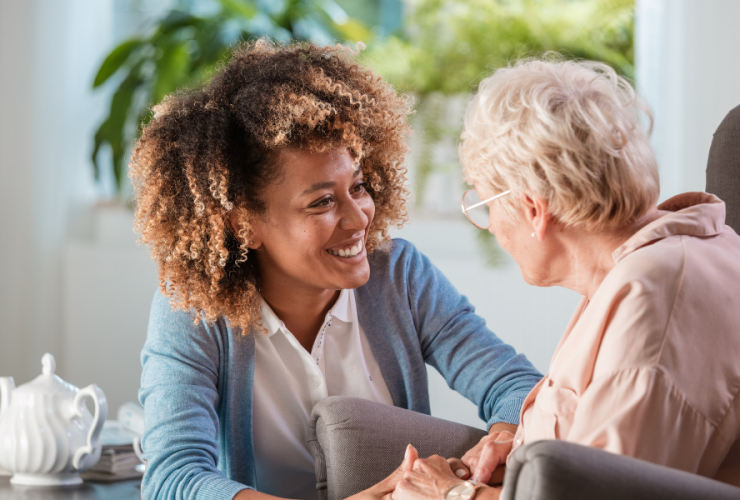Teletherapy has helped to revolutionize the medical field. Now, more seniors than ever before can get access to the help needed to care for their mental health properly. Seniors are no longer confined by geographical locations when it comes to getting that care. It’s now as easy as making a call on your mobile device or laptop. Even better, appointments with Teletherapy professionals can be made anywhere to suit your lifestyle. So you could be at home, the beach or a friend’s house. However, as great as all of that is, many people forget that such convenience comes with a certain amount of risk. It seems like our privacy is always under siege these days. So, how does one protect their privacy and stay secure while trying to improve their mental health?
Make sure you are in a private setting
Before you start your teletherapy session, it’s important to remember that what you will be talking about with your therapist is of a personal nature. The conversation is meant to only be heard by yourself and your therapist. Because of the sensitive and personal nature of what you’ll be discussing, you should be in a physical location that provides as much privacy as possible before your session starts.
For example, you may want to have your session while alone at home, or at the very least, a private room in the house or apartment where family members and friends won’t be able to hear you. If you happen to be out in the world during your therapy session, do your best to find a private room or office; even a stairwell or potentially a bathroom can work. If you are outside, try to go somewhere slightly isolated, such as an unoccupied park section. Or if you have a car, that is another great location.
Examples of places you don’t want to be when participating in senior therapy services are somewhere very public, such as dinner with friends, a show, or anywhere there are a lot of other people.
In saying all that, remember NOT to use your phone’s speakerphone function for these sessions. Doing so kind of destroys the privacy that you’re seeking. Instead, it’s best to use headphones so only you can hear what your online psychologist says. Also, when speaking into your microphone, either directly to your phone or headphones, be mindful of the volume of your voice. Seeking help for your mental health is nothing to be ashamed of and in fact, takes a great deal of strength, however again, if you are discussing your feelings of depression or anxiety, you may not want to have an audience present.
Avoid Using Public/Unsecured Wi-Fi
One of the best parts about how far technology has advanced is that there is free Wi-Fi or wireless internet almost anywhere you go. The main advantage is that you can surf the web on your mobile device without using your device’s data. If you use a laptop, Wi-Fi allows you to log on to the internet almost as if you were at home. When things are convenient and widespread, it’s easy to forget that dangers are still associated with them.
When you use Wi-Fi at a restaurant, airport, or anywhere public, the connection isn’t terribly safe. If all you’re doing on public Wi-Fi is general web surfing, you’re generally okay. However, the real danger comes when you enter passwords, financial information, or any type of personal information. If you are using a public Wi-Fi network to make video or Wi-Fi calls, your information is equally at risk.
This scenario is something to keep in mind when it comes to accessing teletherapy services while using public Wi-Fi. Suppose you are on public Wi-Fi and enter your password to log in. In that case, there is a severe chance that you are, in effect, giving that information to hackers without trying. As the National Council On Aging’s (NCOA) ‘s Director, Economic & Financial Security Genevieve Waterman, stated on the company’s website: “Public networks are crawling with scammers just waiting to intercept your passwords, bank account numbers, and other sensitive information so they can use it later to steal your money or identity. And it doesn’t require them to fool you into giving it up. They just take it.” According to an article on forbes.com, about 35% of people have access to public Wi-Fi 3 to 4 times a month. Meanwhile, 43% of public Wi-Fi users have had their information compromised.
So, what can be done? There are a few options for protecting your privacy and security as a senior. The best option is to only use your trusted internet connection at home in the event you need to enter any personal information. If you HAVE to use public Wi-Fi, then it’s advised to use a Wi-Fi VPN (virtual private network) like Surfshark or Nordvpn, which helps to protect your identity. And, always make sure your virus scanner is up to date.
The Value of White Noise
As a Senior, if you are in a living situation where privacy is virtually impossible, consider a white noise machine. Generally, white noise is great to listen to to help fall asleep. But it does have other uses. For instance, white noise can help to mask the conversation you are having with your senior therapy services from other people. Many streaming services, such as Tubi, have “shows” that are versions of white noise.
Do Not Share Password Information (unless its with someone you trust)
The odds are that you are already familiar with signing up for a service and having to create your passwords. To that end, one universally agreed upon rule of keeping safe online involves all important information. When you sign up for a teletherapy service, you will be asked to create a password to allow you to log in and keep your information secure. When you do create a password, here are some “Do’s” and “Don’ts” I suggest the following:
- DO: Create a strong, unique password that is at least 8 characters long, including numbers, symbols, and letters. In some cases, your web browser can auto-generate a complex password for you. Google Chrome does this, for example, on laptops. In many cases, when you return to the website on your laptop or PC, the browser will auto-fill the password, too.
- DO: If you choose to write down your Telepherapy password in a physical book, make sure that book is somewhere that only you have access to.
- DO: If you take a screenshot of your password on your mobile phone, again save that photo somewhere private.
- DO: When using a teletherapy app, like any app, most have options that allow you to automatically sign in when you open it by auto-filling your password. Other apps allow you to stay signed in. I would advise skipping these options and signing in manually. At the same time, when a session ends, I would recommend signing out of the app and removing the auto sign-in feature. This way, if you forget your mobile device somewhere, no one can log into your account, even if it’s just curious grandchildren.
- DO NOT: Use the same password for your telemedicine therapy apps for multiple websites/apps. It’s something that we have all done at least once. I know that having the same password for social media, email, Netflix, etc., is very convenient. Much more so than having to remember a dozen or more. However, this is very much a case of “don’t put all of your eggs in one basket.” If, for some reason, someone a person got access to the password you use for all your sites, then all of your information could be compromised.
- DO NOT Share your password with anyone except, of course, someone you absolutely trust, such as your child, spouse, or caregiver. Also, do not share it with anyone, especially if someone asks you for it online via chat or whatnot.
Of course, these tips aren’t exclusive to teletherapy apps. The price of being online is eternal vigilance. Like most bits of vital information, having it is one thing, but what you do with it is equally important.
Make Sure That your Apps and /or Computer Has All of it’s Security Updates
When using any app on your mobile device, it’s essential to make sure you have the latest version. It’s very common for apps such as BetterHelp or the Total Life app to release updated versions. These updates are generally released to strengthen the app’s security and fix other bugs to ensure the app continues to run smoothly.
Thankfully, technology has become so user-friendly that, in many cases, you might get a notification letting you know the app has updated itself. In saying that, before beginning any teletherapy session with your online psychologist, it’s important to make sure the version you’re using is the latest one. This ensures you are using the most up-to-date and secure, and encrypted version of your preferred teletherapy app so you will receive the best experience possible.
As an extra precaution, it’s good to go into your mobile device’s app store now and then to manually check for updates. This practice empowers you with control over your app versions, ensuring everything is up to date and secure.
To that end, if you access your teletherapy sessions on your computer, whether a desktop or laptop, it’s crucial to ensure your operating system also has the latest security patches. Like your mobile apps, these updates are primarily done automatically. Odds are, you have been in the middle of something, only to be interrupted by a screen that pops up and says something like, “Your machine has been updated and will restart in five minutes!”
So again, for the most part these things work themselves out. However, like with apps, it’s still a good idea to look under the proverbial hood now and then. By ensuring that your computer’s operating system has all of its security updates, you are one major step closer to making sure that you have a safe and private online experience. This practice is crucial for maintaining the security and privacy of your online teletherapy sessions.
Activate Your Devices “Lockscreen” settings.
A phone or computer lock screen is a tremendous and simple safety tool. Essentially, it was what the name implies: a screen will appear on your phone or computer that locks the device from outside users. Depending on your device’s settings, a lock screen can appear after a certain amount of time if the phone’s screen is not touched. Or if you haven’t used the laptop’s phone or keyboard for a while. With mobile devices, the lock screen can also generally be manually activated with the touch of a button. In some cases, if your mobile phone is linked to your computer, your computer’s lock screen will appear if your mobile phone gets too far away. This is basically your phone telling your laptop, “Hey, we aren’t close by, so to be safe, lock the doors until we get back.”
This way, no one can access your personal or private information if you step away from your computer or if you are in the middle of a call with your online psychologist on your mobile device while talking hands-free, such as using headphones. By allowing your lock screen to turn on automatically after, say, 30 seconds of not being touched, you can freely talk to your teletherapist about depression, anxiety, or your chronic pain while being able to put all of your focus on that call and not having to worry about prying eyes.
The phone’s or other devices’ lock screen ensures that if you are on a website screen that contains personal information, it’s totally safe from prying eyes. If you’re on a laptop you typically would have to enter in a password to unlock your device and use it normally. Generally to unlock your phone’s lock screen you can just swipe the screen. As you can probably imagine, the “swipe and open without the need of a password or any other type of login info” lock screen isn’t the most secure because anyone can just unlock your phone. But with a secure lock screen, you can rest assured that your personal information is protected.
So, to protect your privacy and security, it’s a good idea to go to your device’s settings and make sure that the lock screen can only be deactivated with a password, or using biometrics, like your thumb or fingerprint, or an image of your face. Though it’s important to note that few computers have biometric scanners. It’s true that having to constantly enter passwords or unlock your device(s) with your thumbprint can be annoying. But the benefits of using a secure lockscreen far outweigh this inconvenience. As the old saying goes, an ounce of prevention is worth a gallon of cure.
Final Words
As we’ve learned in this article, it is important to protect your online privacy as you are online on your journey to mental healthcare. Frustratingly, there are and always will be people who want to get your personal information for exploitative purposes. While the telemedicine therapy app and services do their best to ensure your privacy and security, they can do only so much. So, to that end, you must maintain vigilant online safety practices. Though, like anything, it may seem daunting at first, it will get easier and more routine. The overall goal of protecting your privacy and security is to ensure that you can be as relaxed and attentive as possible during your senior therapy services sessions. You’ve already taken the first big step by attempting to get help. Now, it’s just a matter of making it secure so you can get the most out of it.









